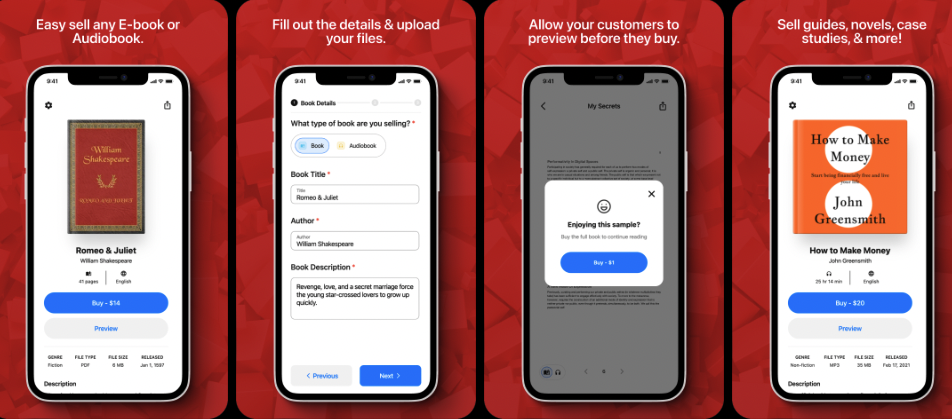Koji, the link-in-bio platform that gives creators a digital storefront on social media platforms like Instagram and TikTok, launched a new e-book tool that lets users sell e-books and audiobooks, the company announced yesterday.
The new tool is essentially a template that creators can use to sell any e-book or audiobook from within social media platforms (Instagram, TikTok, Youtube and Twitch, among others) and anywhere else on the web. Koji also allows creators to make custom add-ons and shareable previews.
Note that every time a customer buys an e-book or audiobook, Koji takes a 10% fee.
Customers can download their purchase and view it via Koji’s native reader and audio player. They can also choose to download and open files in their preferred e-reader like the Kindle app or as an EPUB, PDF or chapterized audio file.
Koji previously launched a separate e-book template last year, which was among the most popular Koji templates, claims Paul Bakaus, head of creators at Koji. However, that template will be replaced with this new e-book template, which gives users access to completely new features like the ability to add reviews as well as give purchasers a free preview of chapters before they are prompted to pay and unlock the full version. Bakaus also told us that there’s an option to sell bundled e-books and audio.
The new e-book tool will likely be a hit with many users and their followers, especially “BookTok” creators, a subculture within TikTok where people recommend books to their viewers. As of this writing, the BookTok hashtag on TikTok has over 113 billion views.
In general, e-book reading has risen in popularity since the beginning of the pandemic, with 30% of Americans in 2021 opting for e-books versus physical books, according to a Pew Research Center survey.
Koji was founded by Dmitry Shapiro, who formerly worked at Google and MySpace Music, and Sean Thielen, a self-taught coder. The link-in-bio platform launched in March 2021 and now serves over 500,000 creators, the company told TechCrunch. Notable creators and celebs include Emily Dobson and Alice Cooper, as well as slightly “smaller” influencers like Brown Girls Who Write, Lauren Giesting and Tasting Thyme.
Koji is free for everyone to use and is accessible to anyone regardless of follower count.
Koji is just like many other link-in-bio tools in which creators can link their social media accounts, merch shops and other projects with one custom URL. However, the company also develops a variety of products it previously called “mini-apps.” Now dubbed “templates,” Koji has optional add-on tools that each hold a separate function yet are all designed for extra monetization. The company takes a commission on most products, ranging between 5% and 15%.
For instance, the company recently launched an “Exclusive Article” app, which lets creators lock written content like articles, blog posts and recipes behind a paywall. Linktree, a major player in the link-in-bio world, recently tested a paywall feature, “Payment Lock,” so users could build payment links around their content.
In just 2022 alone, Koji launched over 100 templates, such as a “Shopify Storefront” app, “Video Shopping,” “Watch Party,” “Listening Party,” and “Tip Jar,” among many others. Overall, Koji provides access to more than 200 of these templates, so creators can sell everything from exclusive images to custom shoutouts and more.
Beyond the templates, Koji also gives users access to analytics via a seller dashboard, where users can see their earnings as well as get insights about their customers, such as where they’re from, what they’re buying, top customers and so on.
Other features that Koji offers are video and gif backgrounds as well as “Highlights,” where users can move their most important links and apps to the top of the link-in-bio page.
Link-in-bio platform Koji launches new tool to let creators sell e-books by Lauren Forristal originally published on TechCrunch
from TechCrunch
via Click me for Details


No comments:
Post a Comment